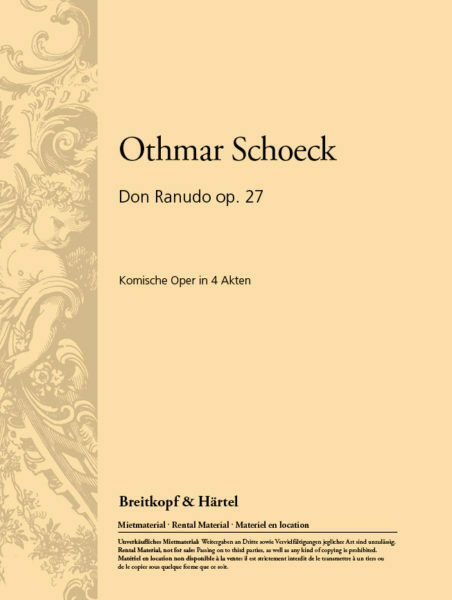Othmar Schoeck (1886–1957) Don Ranudo op. 27
Komische Oper in 4 Akten [Soli,GCh,Orch] 1917/18 Dauer: 95' Text: Armin Rüeger
Soli: SSATTTBarBarB – Chor: SATB – Picc.3(Picc)2(Eh).2.B-Klar.2.Kfg – 4.3.3.1 – Pk.Schl(6) – Hfe
Nachdem Sie die gewünschten Ausgaben in den Warenkorb gelegt haben, können Sie dort die benötigte Stückzahl bei Bedarf noch anpassen.
1. Originalfassung – 2. Dresdner Fassung (1930) in zwei Akten vom Komponisten
Libretto: Armin Rüeger nach der Komödie "Don Ranudo de Colibrados” von L. Holberg
Ort und Zeit: Ein spanisches Kleinstädtchen, um 1750
Personen: Don Ranudo di Colibrados, ein Edelmann (Bass) - Dona Olympia, seine Frau (Alt) - Maria, ihre Tochter (Sopran) - Gonzalo de las Minas, ein Graf (Tenor) - Pedro, Diener Don Ranudos (Bariton) - Leonore, Zofe der Olympia (Sopran) - Gusman, Diener Gonzalos
(Bariton) - Ein Mohr, Gemüsehändler (Tenor) - Ein Gerichtsvollzieher (Tenor)
Schoeck erhielt die Anregung zu dieser Oper von Ferruccio Busoni, der ihn auf "Don Ranudo de Colibrados” des dänischen Dichters Holberg aufmerksam machte. Holberg thematisiert in seiner beißenden Satire merkwürdige Auswüchse des Standeshochmuts unter dem Adel, jedoch auch eine nicht minder komische Rang- und Titelsucht in den bürgerlichen Schichten. Das Stück wurde in Deutschland in einer Bearbeitung von Kotzebue 1801 populär. In dieser Posse wird der Protagonist Don Ranudo, in der Umkehrung "O Du Narr” zu lesen, auch als solcher dargestellt. Armin Rueger, der Librettist, folgt jedoch weitgehend dem Original Holbergs. Außer in vollständiger Gestalt ist das Werk wieder in der auf zwei Akte gekürzten Dresdner Fassung lieferbar, die Schoeck eigenhändig angefertigt hat. Diese Fassung wurde zusammen mit der dramatischen Kantate "Vom Fischer und syner Fru" am 3. Oktober 1930 uraufgeführt.
CD:
Silvia Zarabella (Oboe), Martin Zürcher (Englisch Horn), Musikkollegium Winterthur, Ltg. Werner Andreas Albert
cpo 999 337-2









